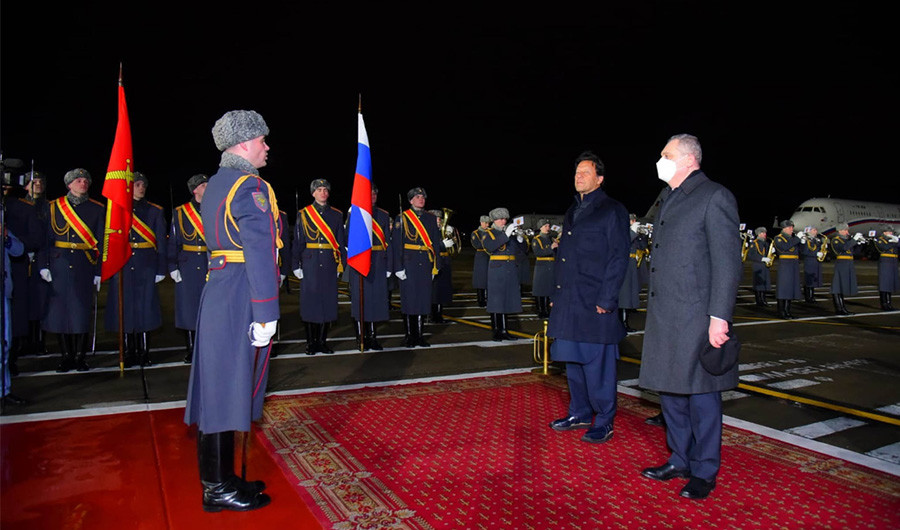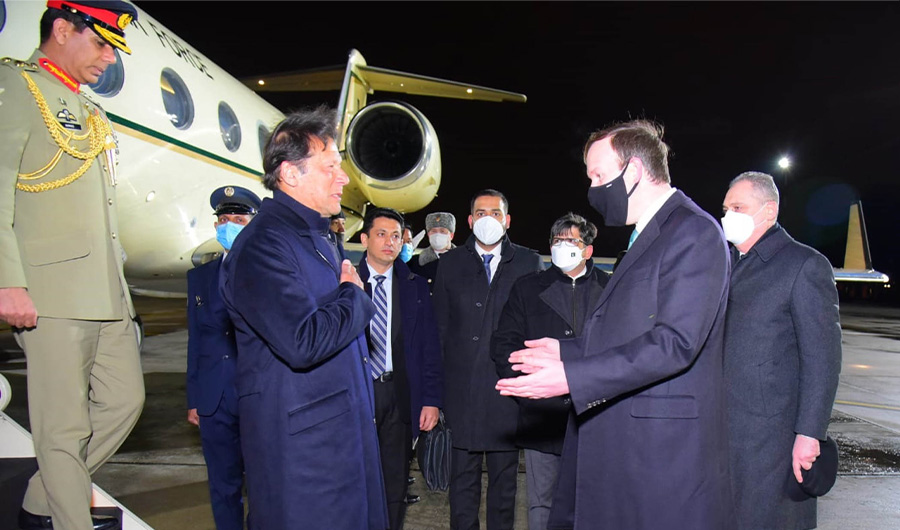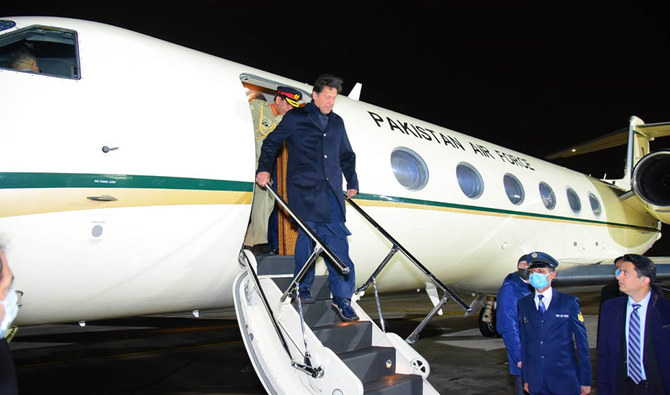KARACHI: Prime Minister Imran Khan would formally discuss potential energy projects with Russian President Vladimir Putin during his two-day official visit to Moscow, announced Pakistan’s energy minister on Wednesday as local business leaders hoped the tour would benefit the country’s economy.
The Pakistani prime minister arrived in Moscow with his senior cabinet members last night and was given red carpet reception by the Russian authorities.
This is the first visit of a Pakistani prime minister to Russia since 1999.
“We have discussed three or four potential projects with Russian teams which have been visiting Pakistan in the last six months,” Pakistan’s energy minister Hammad Azhar said in a video statement before leaving for Moscow with Khan.
“The outstanding issues of the projects, further clarification and detailed discussion will be held between President Vladimir Putin and Prime Minister Imran Khan and I will formally raise this issue with their [Russian] deputy prime minister who also looks after energy affairs,” he added.
In July 2021, Russia and Pakistan signed the shareholders’ agreement to construct an estimated $2.5 billion natural gas pipeline in Pakistan.
The Pakistan Stream Gas Pipeline Project (PSGP), formerly known as North South Gas Pipeline, is a flagship project signed by Islamabad and Moscow back in 2015 to carry 1.6 billion cubic feet per day (bcfd) of gas from Karachi to Lahore.
Pakistan has 74 percent stakes in the 1,100-kilometer pipeline which is scheduled to complete in 2023. The project is one of the largest Russian investments in Pakistan since the Soviet Union set up Pakistan Steel Mills in 1970s.
“Russia is the world’s largest energy supplier and we think there is more space for Pakistan to further strengthen the energy links [between the two states],” Azhar said, adding: “North America, Europe and other countries are deeply linked with Russia for energy supplies.”
The prime minister’s visit to Moscow comes at a time when much of the Western nations have aligned against President Putin after he deployed troops into the breakaway regions of Ukraine.

Pakistan Prime Minister Imran Khan receives guard of honor upon his arrival at the Vnukovo International Airport in Moscow, Russia, on February 23, 2022. (PID)
Reacting to the timing of Pakistan’s diplomatic engagement with Russia, some political analysts said it signaled Khan’s “derision” for the United States and the West.
“Imran Khan has consistently signaled his derision for the US and the West while also seeking economic assistance,” Husain Haqqani, a scholar at the Hudson Institute in Washington and Pakistan’s former ambassador to the US, told Arab News. “The timing of his visit to Russia will only reaffirm his anti-Western worldview.”
“The image of Pakistan’s prime minister next to Vladimir Putin soon after Putin’s invasion of Ukraine will not endear Pakistan to Americans or western Europeans,” he added.
However, economic analysts and business leaders said they expected the prime minister’s Moscow visit to open a new chapter in the bilateral ties between the two countries.
“Russia is willing to invest in our energy sector in a big way, especially in the gas sector where it has greater expertise than anyone else in the world. It is also supporting Europe with infrastructure development,” Dr. Vaqar Ahmed, joint executive director at the Sustainable Development Policy Institute (SDPI), told Arab News.
Ahmed said the gas pipeline project was facing delays due to the issues identified by Russian officials during their meetings with the Pakistani authorities.
“They have pinpointed that our gas regulatory system is obsolete and there is no competition in our gas market,” he added. “The Russians have called for fixing the problem. That is why the gas pipeline project has been facing delays.”
Analysts expect the prime minister to look for Russian investment in Pakistan’s oil exploration sector and seek support to penetrate Central Asian markets.
“The prime minister is also expected to seek Russian help in the promotion of trade through land routes because of the slow land-based trade with Central Asian countries,” Ahmed said. “Russia can help because of its diplomatic influence in the region.”
He added the prime minister could also seek space for Pakistan’s skilled human resource in the Russian market.
While it has not been officially confirmed, Ahmed said the PM might also seek commercial loan from Russia.
“Pakistan has to make repayments of $7-8 billion this year and it is possible that the prime minister would seek short-term commercial lending as the country has availed from Saudi Arabia and China,” he added.
Asked about the bilateral trade between the two countries, business leaders said it was much below the potential due to a lack of interest on both sides.
“Russia has been an unknown territory for Pakistani businessmen since such international business relations largely depend on political ties,” Jawaid Ilyas, member of Pak-Russia Business Council at the Federation of Pakistan Chamber of Commerce and Industry (FPCCI), told Arab News. “Since we were not political allies in the past, there was no Russian or Pakistani trade tilt toward each other.”

Deputy Foreign Minister Russia Igor Morgulov receives Pakistani Prime Minister Imran Khan on his official visit to Moscow, Russia on Feb 23, 2022. (PID)
The bilateral trade volume remains negligible between the two countries since Russian exports to Pakistan were recorded at $34.3 million while its imports from Pakistan stood at $23.8 million in 2020-21, according to the United Business Group (UBG) at the FPCCI.
In contrast to that, the US imported $5.3 billion worth of goods from Pakistan while it exported $3.54 billion worth of goods to Pakistan in 2021, according to the United States Census Bureau.
Pakistani traders said trade between the two sides was done through third country in the past.
“Majority of the trade that took place between them happened through other countries,” Ilyas said. “Neither Russians were interested in looking at Pakistan as a potential trade market nor our business community had general information about Russia.”
However, Pakistani traders are now optimistic about benefiting from Russian market.
“Now the situation has changed,” he added. “Circumstances have gradually pushed us closer to Russia and some political interests have also emerged. We don’t look at Russia as an adversary now but as a potential market.”
Pakistani exporters hope to sell fruits, nuts, textile and leather products, salt, cement, footwear, plastic products and cereals to Russia.












